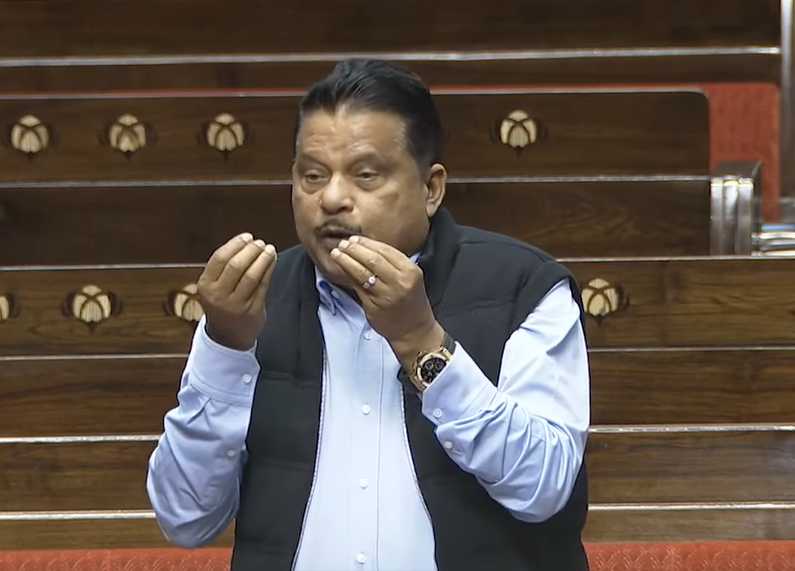


BJP member Nishikant Dubey has raised concerns over the nearly 1.25 crore feedback submissions received by the parliamentary committee scrutinising the Waqf (Amendment) Bill, calling for a probe into their sources, including the possible involvement of ISI and China. He believes the overwhelming response is statistically improbable and may have been orchestrated by foreign entities to manipulate the democratic process, posing a threat to national sovereignty. This demand for investigation highlights the contentious nature of the bill which seeks to interfere in religious affairs and has received opposition from opposition parties and minority groups.
Waqf Bill Controversy: BJP Member Raises Concerns Over 'Statistically Improbable' Feedback Submissions
Background
The Waqf (Amendment) Bill, introduced in Parliament by the Indian government, seeks to amend the Waqf Act of 1995. The amendments aim to regulate waqf properties and boards, which are institutions managing Islamic endowments in India.
Concerns Raised by BJP Member Nishikant Dubey
Nishikant Dubey, a member of the Bharatiya Janata Party (BJP), has raised concerns over the overwhelming number of feedback submissions received by the Parliamentary Committee scrutinizing the Waqf (Amendment) Bill. According to Dubey, the committee received approximately 1.25 crore (12.5 million) submissions, which he deems to be "statistically improbable."
Dubey suspects that foreign entities, such as the Pakistani intelligence agency ISI and China, may have orchestrated this massive response to manipulate the democratic process and undermine India's national sovereignty. He has called for an investigation into the sources of the feedback submissions.
Opposition to the Waqf (Amendment) Bill
The Waqf (Amendment) Bill has faced opposition from various quarters, including opposition parties and minority groups. Critics argue that the amendments interfere in religious affairs and aim to control waqf properties. They also fear that the bill will create a centralized authority that could lead to misuse of waqf funds.
FAQs
Q1: What is the Waqf (Amendment) Bill? A: It is a proposed amendment to the Waqf Act of 1995, which aims to regulate waqf properties and boards in India.
Q2: Why has BJP member Nishikant Dubey raised concerns? A: He believes the overwhelming number of feedback submissions received by the Parliamentary Committee scrutinizing the bill may have been orchestrated by foreign entities to manipulate the democratic process.
Q3: What are the concerns raised by critics of the Waqf (Amendment) Bill? A: Critics argue that the bill interferes in religious affairs, aims to control waqf properties, and creates a centralized authority that could lead to misuse of waqf funds.
Q4: What is the current status of the Waqf (Amendment) Bill? A: The bill is currently under scrutiny by a Parliamentary Committee.
Q5: What possible consequences could arise from the concerns raised by Nishikant Dubey? A: The concerns could lead to an investigation into the sources of the feedback submissions and potentially further delay or even derail the passage of the Waqf (Amendment) Bill.

In a recent incident at the Vasai Fort in Maharashtra, a man dressed as Chhatrapati Shivaji Maharaj got into a heated argument with a security guard over language. The man, who was recording a video, berated the guard for not speaking Marathi and disrespecting the legacy of Shivaji Maharaj. Social media users were divided in their opinions, with some criticizing the man's behavior while others felt the guard needed to be taught a lesson.

In a significant moment for gender equality, President Droupadi Murmu became the first woman to visit the Lord Ayyappa Temple in Sabarimala. Accompanied by her team, she performed Darshan and Puja at the shrine, praying for the well-being and prosperity of her fellow citizens. Her visit symbolized the Supreme Court's decision to lift the ban on menstruating women entering the temple, reminding us that devotion knows no gender barriers.

With early voting just days away, the three major candidates vying to become New York City's next mayor are gearing up for the final debate in what could be their last chance to sway voters. The debate, hosted by Spectrum NY1, The City, and WNYC/Gothamist, will cover issues such as affordability, crime, and the role of former President Donald Trump in the city's politics. With the stakes high and the clock ticking, Democrats Zohran Mamdani and Andrew Cuomo and Republican Curtis Sliwa will need to make a strong case for themselves to secure the future of New York City.

CM Yogi Adityanath's statement about the role of "political Islam" in undermining Sanatan Dharma has sparked controversy and discussion throughout the nation. During an event organized by the Rashtriya Swayamsevak Sangh (RSS), he highlighted the struggles of Indian warriors against political Islam, claiming that this aspect of history is often overlooked. Adityanath's remarks have renewed debates on the representation of India's historical narrative and the impact of colonialism and political Islam.

Samajwadi Party chief Akhilesh Yadav's remarks questioning the government's spending on Diwali celebrations in Ayodhya, and his comparison to Christmas festivities worldwide, have sparked controversy. While the BJP has accused Yadav of being envious of Ayodhya's success, the Vishva Hindu Parishad has criticized him for undermining Indian culture. The comments highlight the tension between political parties over religious and cultural events.

On the occasion of Home Minister Amit Shah's 60th birthday, Maharashtra CM Devendra Fadnavis wished him with a special message on Twitter, calling him the "Chanakya of Indian politics." Fadnavis praised Shah's political acumen and leadership, stating that his contribution to the nation remains unmatched. PM Narendra Modi also conveyed his greetings, commending Shah's dedication to public service and national security. Leaders across India, including former Tamil Nadu CM Edappadi K Palaniswami, extended their wishes and praised Shah's steadfast leadership and tireless dedication.

On Home Minister Amit Shah's birthday, Prime Minister Narendra Modi took to social media to convey his wishes and praise his efforts towards improving India's internal security. Modi highlighted Shah's dedication to public service and hardworking nature, which has earned him admiration from across the country.

In a social media post, Prime Minister Narendra Modi wishes Home Minister Amit Shah on his birthday and acknowledges his dedication to public service. PM Modi also highlights Shah's efforts in strengthening India's internal security. Shah's birthday coincides with the Gujarati new year and he will be attending public events in his home state of Gujarat along with Chief Minister Bhupendra Patel.

In a move to empower widowed women, Madhya Pradesh Chief Minister Mohan Yadav announced on Thursday the implementation of the Kalyani Scheme, offering a financial aid of ₹2 lakh for widow remarriage under Operation Sindoor. This announcement was made at the 377th birth anniversary celebration of Maharaja Chhatrasal, a Bundela warrior known for his courage and national pride. CM Yadav also inaugurated a cultural festival, Virasat Mahotsav, in honor of Maharaja Chhatrasal and the warriors and valor of Bundelkhand.

Prime Minister Narendra Modi celebrates Diwali with Navy personnel aboard INS Vikrant, praising the warship's role in instilling fear in Pakistan. He commemorates India's military might and the bravery of armed forces in Operation Sindoor, while also highlighting INS Vikrant as a symbol of Atmanirbhar Bharat and Made in India. The festive celebrations on board consisted of cultural performances and an air power demonstration, making the occasion deeply symbolic and unforgettable.